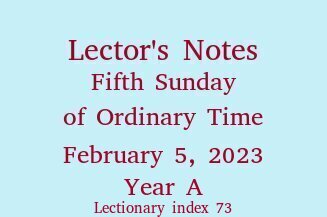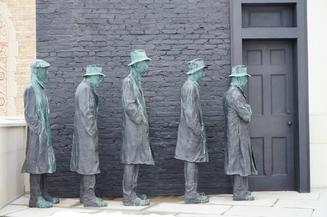

Fifth Sunday of Ordinary Time, February 8, 2026
Former exiles returned to Jerusalem were disappointed that it was taking so long to restore their city. Isaiah told them it was their fault because they were not sharing. Then he gives them an alternative.
Saint Paul had given an eloquent speech to the sophisticated people of Athens, and failed miserably. In his next stop, Corinth, he vowed to get out of God's way and preach only Christ crucified. The results were very different.
As Jesus continues his Sermon on the Mount, he uses two metaphors to teach his followers their special role in the world.
The Historical Situation: The book we know as Isaiah is really the work of three authors, written at different times. Chapters 56-66, what scholars call Third Isaiah or Trito-Isaiah, is from the time the Jews were recently returned from exile in Babylon. (The Exile had been very, very traumatic for the people, and led to some serious re-thinking of their theology, at least on the part of some; their responses are enshrined in the Bible.)
The former exiles had hoped for a quick restoration of their beloved capital Jerusalem, but that project was frustratingly slow. The people wondered why their suffering was so prolonged. The prophet's response is unsympathetic: it's your own fault; it's because you're not sharing.
Proclaiming It: This suggests that disappointment is not an acceptable excuse for failing to care for those worse off than ourselves. God's demand that we share with the hungry and homeless is uncompromising.
So you should read this with great authority in your voice. And notice this structure:
The Historical Situation: Paul had come to Corinth from Athens, where his preaching met derision and rejection. Paul is being very frank here about how miserably his human eloquence had failed. See Acts 17:16-33 for Paul's speech there (it's a great speech, really) and the humiliating response of the sophisticated Athenians. (For another Pauline meditation about knowing Christ crucified, see Philippians 3:7-16.
Here Paul says that in Corinth he chose not to rely on human eloquence, "so that your faith might rest not on human wisdom but on the power of God." His concern, then, is that their faith have the soundest foundation.
Proclaiming It: This reading demands a much more personal, humble tone than the imperatives of Isaiah. It should sound almost apologetic. When you set out to read this to the assembly, make your intention like Paul's, that your proclamation will help dispose the people to a stronger faith. And having said that, I should spend no more of my human eloquence talking about your human eloquence.
Depression Bread Line, 1999 - metal: bronze, by George Segal, 1924-2000, U.S.A. Click here for a short essay about the sculpture. (This computer graphic came from a search of Google images, which credits a user of Reddit named g0dd0gg, who credits imgur.com.)
This page updated February 1, 2026